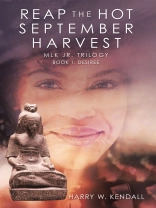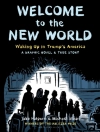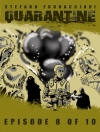The novel is a MLK trilogy, titled Reap the Hot September Harvest. It is literature of the Civil Rights Movement’s history and has a broad appeal to America at large.
On Mother’s Day, 1960, after meeting MLK in Atlanta, Desiree—the title of Book One—and the Freedom Riders are attacked by the Klan in Anniston, AL. Did she faint, or die and return? Is she the reason an elderly Black vet of WWII kills himself? Answers are revealed and rejected. Treatments fail, years pass, desperation sets in. Then, Desiree meets a young minister returning from Egypt with spiritual enlightenment he garnered from an ancient scribe of God’s philosophy. Desiree, now a yoga adept, is intrigued. He claims they are missing links in Blacks’ religious practices, and can demystify the mythology of white supremacy. Her feelings soar, but she soundly rejects his ugly denunciation of Blacks’ force fed Christianity. The minister’s rebound kindles a hasty romance. Desiree purrs, “Why am I a flower of sacrifice.” “Flowers nourish the soul, sacrifice means atonement.” Enduring moments, strumming her heart strings with spiels like why African-Americans are proponents of jazz, ripens her for the obvious question. Desiree resists; she is not ready to reveal her dark side. The reverend persists, and says he is the chosen pastor of a church in a small Southern town. It promises a chance to establish the MLK Center of Social Awareness and Spirituality, make MLK’s Promised Land a reality.
In Book Two we read the reverend’s story, while Desiree arranges to relocate, become a pastor’s wife and teach yoga.
लेखक के बारे में
Harry W. Kendall, eighty-eight years old, is a black novelist, playwright, and yoga enthusiast. He earned a Master of Fine Arts degree from Vermont College of Fine Arts and a journalism degree from Rutgers University. Harry grew up in the steel mill and coal mine region of western Pennsylvania. He began writing at midcareer as a worthy candidate of a central New Jersey newspaper’s joint effort with Rutgers to comply with the 1968 report of the National Advisory Commission on Civil Disorders. It stressed the hiring of blacks and Latinos to redress the imbalance of whites and blacks in the news media. While working on his MFA, Harry concentrated on meditation and found his true voice in writing from an inner sacred place. He has conducted workshops on meditation and writing for the National Writers Union. Harry’s first novel, Truth Crushed to Earth, self-published in 1999, won a Certificate of Merit from Writers Magazine. He has published short stories in literary magazines and lectured at the Politics and Prose Bookstore in Washington, DC; Pratt Library in Baltimore, Maryland; Swarthmore College in Swarthmore, Pennsylvania; City College in New York; St. Vincent College in Latrobe, Pennsylvania, and Brattleboro, Vermont.












